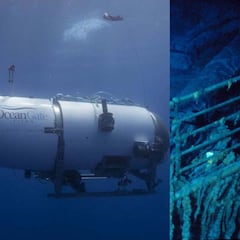Can the families of the Titan sub passengers sue even if they signed liability waivers?
It’s believed that all the passengers aboard the Titan submersible signed a liability waiver even in the case of “death”, but could families still sue?

Sunday 18 June, five people aboard the Titan submersible perished less than two hours into a descent to visit the remains of the Titanic lying on the floor of the North Atlantic Ocean. Five days later a debris field of the most recent wreckage was discovered just 1,600 feet from the ocean liner that sank over 100 years ago.
Any trip to such depths, around 12,500 feet below sea level, is extremely risky. And the passengers on the Titan, who each paid $250,000 for the adventure, had been made aware of that prior. It’s believed that all of them signed a liability waiver which stated: “This experimental vessel has not been approved or certified by any regulatory body and could cause physical injury, emotional trauma or death.” In fact, the contract mentions the word ‘death’ three times on the first page alone.
Can the families of the Titan sub passengers sue even if they signed liability waivers?
Even if the Titan’s passengers signed the liability waiver OceanGate might not be completely protected from potential lawsuits from the victim’s families according to legal experts. Much will depend on the language of the waiver as they are not always ironclad. A judge may reject it as well if there is evidence of gross negligence or there were hazards that were not fully disclosed to the signatories.
“If there were aspects of the design or construction of this vessel that were kept from the passengers or it was knowingly operated despite information that it was not suitable for this dive, that would absolutely go against the validity of the waiver,” Matthew D Shaffer, a Texas-based personal injury attorney and maritime law expert, told Reuters.
Another avenue that the victim’s families may have is if one of the component parts failed. Then it could be the manufacturer of that particular piece that may be held responsible.
CBS reporter David Pogue and the Simpsons writer Mike Reiss describe what it was like inside the Titan, the missing submersible which disappeared while taking tourists to see the wreckage of the Titanic https://t.co/rHr3lBSspC pic.twitter.com/2I2p5cuzt9
— Reuters (@Reuters) June 21, 2023
Doubts raised about the safety of the Titan submersible
Concerns had been raised about the seaworthiness of the vessel to plunge to such depths as the tragedy played out last week. The New York Times reported that in 2018, David Lochridge, OceanGate’s then-director of marine operations, wrote a scolding report on the Titan saying that it needed more testing.
That same year, the deepwater expedition company received a letter from over three dozen people in the industry calling for the submersible to undergo a certification process by a qualified third-party organization. The vessel’s creator, Stockton Rush, reportedly said that regulations were stifling innovation in submersibles.
Related stories
Additional concerns were raised the following year by Karl Stanley, an expert in submersibles. He went on a two-hour dive on board the Titan to a depth of 12,000 feet off the coast of the Bahamas. He emailed Rush about hearing loud cracking noises that got louder and louder as the vessel descended which set off alarms for him.
A series of investigations have been opened into the “catastrophic implosion” by numerous authorities to figure out what happened to the Titan. Currently, recovery teams are collecting the pieces that have been mapped out. Criminal inquiries have not been ruled out but it will be some time until all the details are known.


